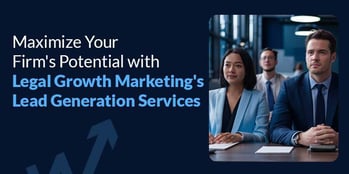Choosing the Right Legal Lead Generation Company for Personal Injury Cases: A Law Firm’s Guide

In the competitive realm of personal injury law, having a steady stream of high-quality leads can be crucial. This guide aims to help law firms specializing in personal injury cases navigate the complexities of selecting the right legal lead generation company.
Understanding Personal Injury Leads
Personal Leads Defined
Personal injury leads refer to potential clients seeking legal assistance for personal injury claims. These leads vary in terms of source, quality, and exclusivity.
Types of Leads
- Exclusive Leads: Sold to only one law firm, offering higher conversion potential.
- Shared Leads: Distributed to multiple firms, leading to increased competition.
- Live Transfer Leads: Directly connect potential clients to law firms in real-time.
Factors to Consider
Experience and Expertise
A company with a proven track record in personal injury leads is preferable.
Quality of Leads
Evaluating the quality of leads is pivotal in choosing a legal lead generation company. This assessment includes:
- Conversion Rates: High-quality leads should demonstrate a strong history of converting into actual clients. Review historical data provided by the company to understand the average conversion rate of their leads.
- Screening Process: The thoroughness of the lead screening process is critical. Determine if the company uses specific criteria to assess the viability of a lead, such as the severity of the injury, the jurisdiction, or the potential value of the case.
Lead Generation Methods
The method by which leads are generated significantly influences their quality:
- Organic Sources: Leads generated through SEO, content marketing, or referrals are often considered more authentic and have a higher potential for conversion.
- Paid Advertising: Leads sourced through paid channels like PPC campaigns or social media ads can be effective but may require additional vetting for quality assurance.
Lead Exclusivity
The exclusivity of leads is a major factor:
- Exclusive Leads: These are sold to only one law firm, reducing competition and potentially increasing the likelihood of conversion. However, they are generally more expensive.
- Shared Leads: More cost-effective but shared among multiple firms, which could lower the chances of conversion due to increased competition.
Case Screening Process
A rigorous screening process is crucial:
- Criteria for Screening: Understand what criteria the company uses to screen potential leads. This might include the nature of the injury, the location of the client, and the clarity of liability.
- Verification Process: Determine how the company verifies the information provided by leads, ensuring that they are genuine cases with real potential.
Researching Potential Companies
Online Research
Conducting thorough online research is a crucial step in assessing potential legal lead generation companies.
Reviews and Testimonials
- Depth of Feedback: Look beyond surface-level comments. Detailed reviews can provide insights into the company's strengths and weaknesses.
- Consistency of Feedback: Assess whether the feedback is consistently positive, negative, or mixed. Pay attention to recurring themes or issues raised by multiple clients.
- Source of Reviews: Consider the source of the reviews. Industry-specific forums or legal directories may offer more reliable insights compared to general review platforms.
Ratings
- Industry-Specific Ratings: Check for ratings in legal industry publications or websites. These ratings are often more relevant as they reflect the company's standing in the legal sector specifically.
- General Business Ratings: Websites like the Better Business Bureau (BBB) can provide a broader view of the company’s overall business ethics and customer satisfaction.
Case Studies and Success Stories
Gaining insights from the company's previous work can be invaluable.
Look for case studies that provide detailed metrics like lead conversion rates, average case values obtained, and client acquisition costs. Compare the performance metrics of different lead generation companies to understand which one aligns best with your firm’s goals.
Seek out authentic and genuine testimonials, possibly even reaching out to the firms mentioned for a more candid conversation about their experience.
Diversity of Testimonials: Look for testimonials from a diverse range of law firms, as this can indicate the lead generation company's ability to cater to various needs and sizes of firms.
Requesting Samples
Requesting samples is a direct way to assess the quality of the leads a company provides. Requesting samples allows a firsthand evaluation.
- Sample Leads: Ask for a set of sample leads to assess their quality and relevance to your specific practice area.
- Follow-Up Process: Evaluate the process of following up on these sample leads, which can give you an idea of the support you’ll receive.
Cost and ROI
Pricing Models
Different pricing models offer various advantages:
- Pay-per-Lead: You pay for each lead provided, which can be beneficial for budgeting and assessing individual lead quality.
- Subscription Plans: A fixed monthly or annual fee for a certain number of leads, beneficial for consistent lead flow.
ROI
Assessing the ROI is crucial:
- Cost vs. Quality: Balance the cost of the leads against their quality and potential return. High-cost leads are justifiable if they have a higher conversion rate.
- Long-Term ROI: Consider the long-term return, factoring in the lifetime value of a successfully converted lead.
Communication and Transparency
Effective communication and transparency are vital:
- Support Channels: Ensure the company offers accessible customer support, preferably with multiple channels like phone, email, and chat.
- Reporting: Look for transparency in reporting lead generation activities, including detailed metrics and regular updates on performance.
Contract Terms and Exit Strategy
Understanding and negotiating the terms of the contract is critical to protect your firm's interests.
- Duration of Contract: Consider the length of the contract and whether it aligns with your firm’s lead generation goals.
- Adjustability: Consider looking for clauses that allow for adjustments in volume or type of leads, adapting to your firm's changing needs.
Exit Strategy
- Termination Clauses: Understand the conditions under which the contract can be terminated, including any notice periods and associated costs.
- Lead Transfer: Consider if there are provisions for transferring or retaining leads if you decide to end the partnership, safeguarding your investment.
The Importance of Long-Term Partnerships
Cultivating a long-term relationship with a lead generation company can be helpful for a few reasons. A long-term partner will often better understand your specific requirements over time and can tailor their services accordingly. Similarly, a long-standing partner may be able to become deeply familiar with your firm's brand, ethos, and approach to personal injury cases, enabling them to align their lead generation.
Conclusion
Selecting the right legal lead generation company is a pivotal decision for personal injury law firms. By considering the the right factors, firms can position themselves to make informed decisions, and work towards a steady flow of quality leads and maximizing their ROI. Conducting thorough research and due diligence is key to forging a successful partnership.
Remember, if you’re looking for a lead generation service that can change your approach to lead generation, don’t hesitate to get in touch. Learn how Legal Growth Marketing can help your firm and book a meeting with sales today.



